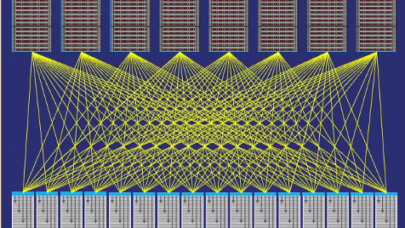
2023 Winter Classic Finale – VIDEO RECAP
April 24, 2023
February 14th to April 15th – it’s been a long run for the 2023 Winter Classic Student Cluster Competition. 63 students from HBCU and HSI schools learned ha Read more…

Cornelis Networks Wins $18M NNSA Award to Advance Omni-Path
May 4, 2022
Intel spinoff Cornelis Networks, custodian and developer of the Omni-Path networking portfolio, is now closer to reaching its next-gen networking roadmap targets thanks to an R&D contract with the Department of Energy’s National Nuclear Security Administration (NNSA). The contract is valued at $18 million. The Next-Generation High Performance Computing Network (NG-HPCN) project brings together NNSA labs and... Read more…

RSC Group Touts Its ‘Tornado’ Platform as Russia Is Cut Off
April 20, 2022
Russia’s invasion of Ukraine—which will soon enter its second month—set off the most sweeping salvo of sanctions seen since the Cold War, with companies from Disney to McDonald’s suspending operations in Russia. The computing sector has been no exception, with virtually every heavy-hitter ending sales to the country, including AMD, Intel... Read more…

With New Owner and New Roadmap, an Independent Omni-Path Is Staging a Comeback
July 23, 2021
Put on a shelf by Intel in 2019, Omni-Path faced a uncertain future, but under new custodian Cornelis Networks, OmniPath is looking to make a comeback as an independent high-performance interconnect solution. A "significant refresh" – called Omni-Path Express – is coming later this year according to the company. Cornelis Networks formed last September as a spinout of Intel's Omni-Path division. Read more…

- Click Here for More Headlines

Whitepaper
How Direct Liquid Cooling Improves Data Center Energy Efficiency
Data centers are experiencing increasing power consumption, space constraints and cooling demands due to the unprecedented computing power required by today’s chips and servers. HVAC cooling systems consume approximately 40% of a data center’s electricity. These systems traditionally use air conditioning, air handling and fans to cool the data center facility and IT equipment, ultimately resulting in high energy consumption and high carbon emissions. Data centers are moving to direct liquid cooled (DLC) systems to improve cooling efficiency thus lowering their PUE, operating expenses (OPEX) and carbon footprint.
This paper describes how CoolIT Systems (CoolIT) meets the need for improved energy efficiency in data centers and includes case studies that show how CoolIT’s DLC solutions improve energy efficiency, increase rack density, lower OPEX, and enable sustainability programs. CoolIT is the global market and innovation leader in scalable DLC solutions for the world’s most demanding computing environments. CoolIT’s end-to-end solutions meet the rising demand in cooling and the rising demand for energy efficiency.
Download Now
Sponsored by CoolIT
Whitepaper
Transforming Industrial and Automotive Manufacturing
Divergent Technologies developed a digital production system that can revolutionize automotive and industrial scale manufacturing. Divergent uses new manufacturing solutions and their Divergent Adaptive Production System (DAPS™) software to make vehicle manufacturing more efficient, less costly and decrease manufacturing waste by replacing existing design and production processes.
Divergent initially used on-premises workstations to run HPC simulations but faced challenges because their workstations could not achieve fast enough simulation times. Divergent also needed to free staff from managing the HPC system, CAE integration and IT update tasks.
Download Now
Sponsored by TotalCAE
Advanced Scale Career Development & Workforce Enhancement Center
Featured Advanced Scale Jobs:
HPCwire Resource Library
HPCwire Product Showcase
© 2024 HPCwire. All Rights Reserved. A Tabor Communications Publication
HPCwire is a registered trademark of Tabor Communications, Inc. Use of this site is governed by our Terms of Use and Privacy Policy.
Reproduction in whole or in part in any form or medium without express written permission of Tabor Communications, Inc. is prohibited.
























